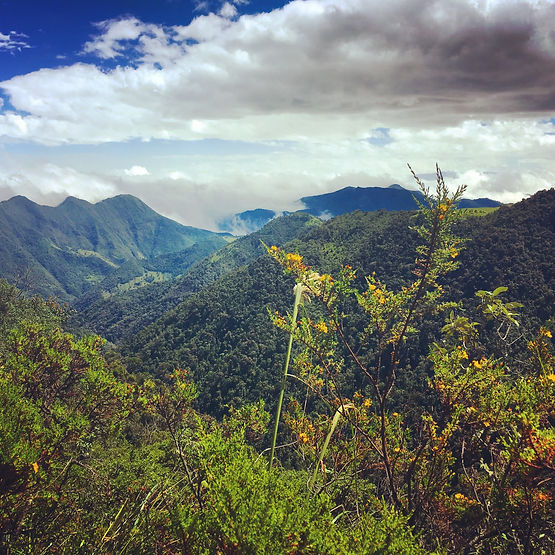

Karen Marie Pedersen
CV
2025-Present
Post Doctoral Researcher
2019-2025
PhD Candidate TU Darmstadt
2015-2018
Community-based environmental conservation volunteer-Perú
2012-2015
Masters Student Wright State University
2010-2010
Research assistant primate behavior,
Puerto Rico
2009-2009
Wildlife rehabilitation and environmental education intern Brukner Nature Center
2005-2009
Study of Biology at the Wright State University
Research interests
I am currently working towards my PhD within the Ecological Networks group at TU Darmstadt, and I am also a member of the REASSEMBLY working group. REASSEMBLY is a German-Ecuadorian collaboration working within the Ecuadorian Chocó.
I have taken a non-traditional path to a doctoral program. While I think I always knew I would get my doctorate, instead of applying right after my bachelor's degree program, I began to work in wildlife rehabilitation and environmental education. I later worked in sustainable development in Peru. These experiences, in addition to my formal education and teaching at the university level, have provided me with interesting life experiences, perspectives, and skills that I use to inform my research methods and research questions.
Within the context of REASSEMBLY, I study dung beetle trophic network reassembly across a forest recovery gradient in the Ecuadorian Chocó. Dung beetles are good predictors of habitat quality. First, because they are sensitive to environmental changes brought about by deforestation and because they depend upon medium to large-bodied mammals for sustenance. This means they will be indicators of both habitat conversion and hunting pressures.
Of the many themes I address in my research into dung beetle trophic networks, I find two of my methodologies most exciting. First, I use dung beetle gut content DNA to create dung beetle-mammal dung networks. This method allows us to overcome some of the logistical issues around procuring enough different types of mammal dung for large-scale experiments of dung beetle-mammal dung networks. The second is modular insect camera traps, which allow for more detailed studies of dung removal and secondary seed dispersal by dung beetles. The cameras themselves are highly customizable, which allows them to be optimized for the research question and study organism.

Contact
karen.pedersen@tu-darmstadt.de
B1|01, Room 261
Karen Marie Pedersen
Biology Department
Technische Universität Darmstadt
Schnittspahnstr. 3
64287 Darmstadt
Germany

Publications
Escobar S, Newell FL, Endara MJ, Guevara-Andino JE, Landim AR, Neuschultz EL, Hausmann R, Müller J, Pederen KM, Schleuning M, Tremlett CJ, Villa-Galaviz E, Schaefer HM, Donoso DA, Blüthgen N. (2025) Reassembly of a tropical rainforest ecosystem: A new chronosequence in the Ecuadorian Chocó tested with the recovery of tree attributes. Ecosphere 16:e70157. DOI: 10.1002/ecs2.70157
Gould, E., Fraser, H.S., Parker, T.H. ... Pedersen KM, ... Zitomer RA (2025) Same data, different analysts: variation in effect sizes due to analytical decisions in ecology and evolutionary biology. BMC Biol 23, 35 DOI: 10.1186/s12915-024-02101-x
Grella N, Pedersen K, Blüthgen N, Busse A, Donoso DA, Falconí-López A, Fiderer C, Heurich M, Kriegel P, Newell FL, Püls M, Rabl D, Schäfer HM, Seibold S, Tremlett CJ, Feldhaar H, & Müller J (2025) Vertebrate diversity and biomass along a recovery gradient in a lowland tropical forest. Biotropica, 57(1), e13417. DOI: 10.1111/btp.13417
Pedersen KM, von Beeren C, Oggioni A, Blüthgen N (2024) Mammal dung–dung beetle trophic networks: an improved method based on gut-content DNA. PeerJ 12:e16627 DOI: 10.7717/peerj.16627
Marín-Armijos D, Chamba-Carrillo A, Pedersen KM (2023) Morphometric changes on dung beetle Dichotomius problematicus (Coleoptera: Scarabaeidae: Scarabaeinae) related to conversion of forest into grassland: A case of study in the Ecuadorian Amazonia. Ecology and Evolution 13 e9831. DOI 10.1002/ece3.9831
Pedersen KM, Blüthgen N (2022) Seed size and pubescence facilitate secondary dispersal by dung beetles. Biotropica DOI: 10.1111/btp.13052
Pedersen KM, Shanee S, Olivera Tarifeño CM (2019) Evidence of opossum (Didelphis sp.) Predation by white-fronted capuchins (Cebus yuracus) in Copallín Private Conservation Area Amazonas, Perú. Neotropical Primates